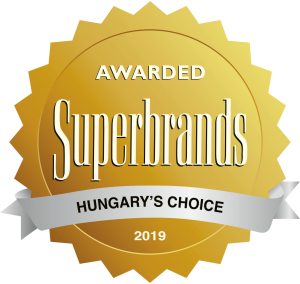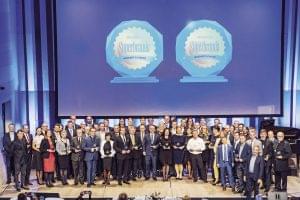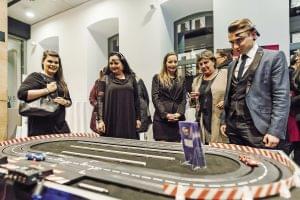Brand-building is of greater importance than ever
In lack of continuous communication, awareness of a brand may easily diminish. Only brands that keep building themselves can be a success on the long run. Superbrands Programme remains committed to brand-building and does its best to help super brands maintain their reputation.

The Superbrands Programme created by the Brand Council in Great Britain in 1994 was launched in Hungary in 2004, where it was extended to business brands in five years. Superbrands is tested-and-tried tool of building consumer and business confidence that guarantees no eternal success, since each brand needs to get worthy of it every year. According to a GfK survey, consumers mainly associate „trust” and „quality” with Superbrands.

Determining a brand’s value will never be exact science, but consumers and business decision-makers will always need practical information on how certain brands are perceived. In Hungary, more than forty experts support our work and rate the brands each year. Superbrands, however, can only serve as a tool of orientation, if it constantly develops its selection frameworks, strengthens impartiality, recognises brand-related risks as well as filters out dividing brands.

A brand is not only a logo or a trademark, but a set of features including, but not limited to reputation, popularity, and loyalty. Every year, Superbrands status is awarded to hundreds of brands in two categories (Superbrands and Business Superbrands) based on a number of criteria.


//
New times, new preferences
Flexibility, transparent and swift communication are necessary!

Tamás Barna
managing director
Republic Group
The Covid-19 crisis changed people’s lives and affected B2B and B2C relationships as well. Those business where keeping in touch with customers in person is a daily task had a hard time, but the ones that could use digital tools for this were able to stabilise operations. I think that those brands came out of this situation as the winners that reacted to the transformed consumer insight, and communicated transparently and swiftly. Obviously it is very difficult to prepare for the unknown and the infinite number of scenarios. Managers need to be flexible and quick in adapting to the new situation. In addition to these characteristics, they also have to prepare their companies for the most efficient principles of operation. //
Speed and strengthening consumer trust is the key

Dr. Ildikó Fazekas
director
Self-regulatory Advertising Board
Our experience at the Self-regulatory Advertising Board is that companies reviewed their advertising strategies after the first shock caused by the COVID-19 pandemic, to see whether they comply with the new situation. One of the key factors was speed: can brands make decisions fast enough to conform to the new situation? My view is that the other key factor is consumer trust, which is one of the most important components of brand equity. When there is some kind of threat, consumers want safety. This safety can be provided by a good brand, one that shoppers can trust. Since winning the Superbrands prize is the result of successful brand building, these brands have better chances in crisis situations. //
Looking for massive handholds

Zoltán Fekete
secretary general
Branded Goods Association Hungary
The corona crisis has turned the economy upside down and we cannot see the end of this long process yet. It is still unclear how marketing is transformed. Upon the outbreak, panic buying focused more on product categories than brand preferences, and the amount and content of advertising messages as well as the primary communication channels were changing rapidly. Now, on the brink of a second wave, manufacturers and retailers keep adjusting their portfolios and stressing messages centred around „safety and trust” in order to lure shoppers who have grown precautious with spending. In the current uncertainty, we must also survive a crisis of confidence. I hope that Superbrands can provide massive handholds while re-establishing consumer and business confidence. //
Can also be viewed as an opportunity

Zsuzsanna Hermann
MD-editor-in-chief
Trade magazin
In March Hungary’s economic sentiment index dropped from 104.9 points to 102.8 points – and this had happened before the lockdown! Due to the pandemic brands are forced to build consumer and business trust in extraordinary conditions. However, with the right communication getting through the crisis together can strengthen the ties between brands and their buyers. When evaluating the Superbrands entries, I was focusing on efficient brand communication, clear messages, and how much brands were supporting partners and protecting workers. //
Companies can’t protect themselves from all the effects of the second wave

Dr. Péter Keresztesi
CEO
Modern Media Group
From many perspectives the Superbrands prize can serve as a compass in a crisis period too, guaranteeing to consumers that the quality of the winner products and services is higher than the average. In a crisis period consumers focus on other products than they usually do and often they have to make do with fewer channels of retail or reduced services when shopping. The second wave of the pandemic can extend this special period, but good brand strategy and brand communication adapt flexibly to this new situation. Those companies which have innovative solutions in sales as well can get a competitive advantage. Still, companies won’t be able to protect themselves from all effects of the second wave. //
Consumption during and after the pandemic

Dr. Ákos Kozák
business partner
Impetus Research
Let me start out by saying that half a year isn’t enough to draw conclusions. What I see today is that the pandemic didn’t generate real disruptive changes. Certain technologies and trends known earlier became stronger, while others weakened. This isn’t the time when consumers want companies to come out with new innovations all the time. Building trust is what is essential now and companies need to fill a so-called Point of Trust position in the lives of both employees and consumers. Brands have always had a trust building function and in the current situation this becomes even more important. The task of brands now is to get through everyday life together with consumers – this responsibility is big enough in itself. //
Long-term partnership will be the key to success

Zsófia Lakatos
president
Hungarian PR Association
The Covid-19 crisis has shaken the trust of people in the world around them. At the moment it can’t be told to what extent we will be able to return to life before the pandemic, but certain trends are already visible. One of these is that we buy and waste less. The so-called LOHAS (lifestyle on health and sustainability) target group is becoming more influential and these consumers don’t accept empty brand messages. In the future the key to success won’t be simple selling but ling-term partnerships, as consumers will be looking for responsible brands that contribute values and deliver solutions. Brands must live up to these expectations and Superbrands winners have a small advantage as they don’t have to start from scratch. //
They can even benefit from it

Dr. Bálint Nagy
head of marketing faculty
IBS
Big brands are built from big money and decades of investing can make them resistant even at the time of crisis. The coronavirus is definitely a crisis situation and many brands reacted to it very innovatively, e.g. KFC temporarily stopped using the ‘It’s Finger Lickin’ Good’ slogan. Strong brands with great brand equity can cope with the Covid-19 situation better, what is more, they can even benefit from it, for instance by winning prizes in competitions or renewing their set of creative tools. Many Superbrands winners show a good example for turning a difficult situation around, making the brand even stronger than before – these strategies are worth studying. //
Winners of the crisis situation

Kázmér Nyomárkay
editor-in-chief
K&K Magazine for SMEs
Many companies were hit hard by the coronavirus pandemic, but some of them do find a way to expand at times like these. Those who step on the break and hardly communicate or companies that don’t adapt to the new situation won’t come out of the crisis as winners. Kifli.hu is a good example of how to do things well in crisis situations: their sales have been growing fast since the beginning of the pandemic, thanks to their quality products, one-day delivery and a good time slot strategy. //
Online relationships are gaining ground

Dr. István Salgó
CEO
Hungarian Business Council for Sustainable Development
We found ourselves in a new world this year: the coronavirus changed our lives. Social distancing strengthened the role of online relationships in our private and business lives alike. This created a new situation for every enterprise. Those businesses that have been doing conscious brand building work and communicating this to customers in a targeted fashion – for instance with the Superbrands prize – were better prepared for the new challenges, and they can now also uncover new long-term brand building opportunities. The general experience from the different reactions to the new situation is that those who didn’t only react quickly and in a complex fashion, but were also able to make the changes permanent, are very likely to improve their market performance. //
Do it ‘now’ and not ‘sometime in the future’!

Dr. János Serényi
owner-MD
Értéktrend Consulting
I don’t agree with those who say that the best brands changed their communication strategies completely because of the pandemic. The ‘champions’ basically keep adapting to consumer needs as much as possible. On the other hand, it is also true that the changes in certain expectations must be followed by some characteristics of the communication – and this needs to be done ‘now’ and not ‘sometime in the future’! In line with this, many Superbrands winners quickly realised that communication that is talking about empathy and helpfulness is needed more than ever before. What is more, these need to be backed by actual steps taken. The role of storytelling has also become much more important. //
Certain messages are becoming more important

Dr. Gedeon Totth
head of marketing faculty
Budapest Business School
The Covid-19 pandemic generated big changes in shopping behaviour, but many of these new types of behaviour won’t stay with us in the long run. What is interesting to me is what the so-called non-winners of this new situation will do to regain their positions; probably they will start to innovate, which is really good news to consumers. In the present situation perhaps more attention is paid to certain messages. During a crisis brand strategy must focus on brand equity, defining the value that can help consumers to solve certain problems caused by the crisis. Brands must prepare for the second wave of the pandemic, using their own and their competitors’ experiences, plus well-working solutions from brands active in other fields. //
Related news
Focusing on fair competition and ethical advertising
🎧 Hallgasd a cikket: Lejátszás Szünet Folytatás Leállítás Nyelv: Auto…
Read more >Generations X and Y would be happy to cook more
🎧 Hallgasd a cikket: Lejátszás Szünet Folytatás Leállítás Nyelv: Auto…
Read more >









